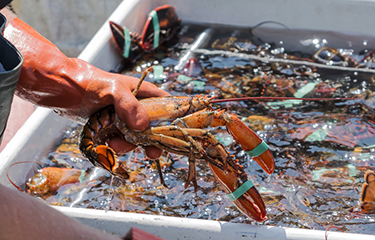U.S. President Donald Trump has signed a new order intended to help the country’s lobster industry, stemming from a 5 June press conference in Maine.
The new order will task the United States Trade Representative (USTR) with keeping close track of the progress made by China under the most recent, “Phase One” of a trade deal signed by President Trump. That deal was beneficial for the U.S. lobster sector, which experienced a massive downturn in exports to China in the wake of retaliatory tariffs that the country implemented in July, 2018.
The new presidential order also includes potential monetary assistance to U.S. lobster fishermen and processors.
As part of the "Phase One" agreement, China agreed to purchase large quantities of U.S. manufactured and produced goods, including agricultural products. Lobster is included in that agreement, with China agreeing to purchase roughly USD 150 million (EUR 139 million) worth of lobster from the U.S.
“The lobster industry is a crown jewel of America’s seafood industry. From 2015 to 2018, American lobster was the most valuable single seafood species harvested in the United States, with Maine accounting for approximately 80 percent of that value each year,” Trump’s new order states. “It is, therefore, the policy of my administration to mitigate the effects of unfair retaliatory trade practices on this important industry.”
Maine lobster had been on pace for a record-setting year in terms of export values in 2018, prior to the start of the Sino-U.S. trade war initiated by Trump. In 2017, Maine exported USD 132 million (EUR 117 million) worth of lobster, with most of that total made up of exports to China. In 2018, before the tariffs kicked in, the state had already exported USD 87 million (EUR 68.3 million) in lobster to China by June, nearly double the amount it had exported the previous year.
The new memorandum includes provisions to ensure that China is buying the agreed-upon amount of lobster, including monthly reviews of the exports to China by the USTR. If China does not meet that obligation, the order includes a provision allowing the USTR to install reciprocal tariffs.
"In the event that the Trade Representative determines that China is not meeting its purchase commitments under the Phase One agreement with respect to seafood, the Trade Representative shall consider, to the extent permitted by law, taking all appropriate action to impose reciprocal retaliatory tariffs on seafood exports from China," the order states.
Another key provision included in the new memorandum is a section specifically about protecting the U.S. lobster industry through assistance.
“The Secretary of Agriculture shall, within 60 days of the date of this memorandum, consider taking appropriate action, to the extent permitted by applicable law, to provide assistance to fishermen and producers in the United States lobster industry that continue to be harmed by China’s retaliatory tariffs,” the order states.
It adds that the Secretary of Agriculture "shall also consider including, to the extent permitted by applicable law, the United States lobster industry and other segments of the United States seafood industry in any future assistance provided to mitigate the effects of China’s retaliatory trade practices."
The exact details of that assistance are as of yet unknown. However, Trump made a similar move to assist farmers impacted by the trade war, committing billions of dollars in federal funding to offset lost sales to China.
The order also includes a section addressing "negative effects of the [Comprehensive Economic and Trade Agreement] between Canada and the European Union." Canada has lower tariffs on its lobster products in the E.U. thanks to the trade agreement, something that the Maine lobster industry has called for challenges to in the past.
Maine’s congressional delegation was surprised by Trump's decree, and welcomed it.
“I’m not questioning motivation. I don’t care if he likes lobsters for a state dinner,” Senator Angus King, who caucuses with Democrats, told the Bangor Daily News. “If this is what he’s doing, I’m all in.”
The Maine lobster industry peaked in volume and value in 2016.
In a message posted on Twitter, Trump blamed his predecessor, former U.S. President Barack Obama, for the lobster industry's decline.
“Pres. Obama destroyed the lobster and fishing industry in Maine,” Trump said in a tweet soon after signing the new order. “Now it’s back, bigger and better than anyone ever thought possible. Enjoy your “lobstering” and fishing! Make lots of money!”
Photo courtesy of WoodysPhotos/Shutterstock







